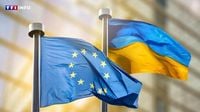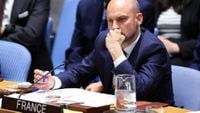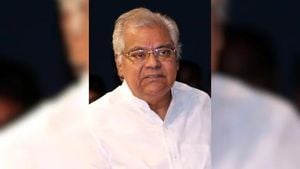On May 1, 2025, French Foreign Minister Jean-Noël Barrot made a bold statement, declaring that Russian President Vladimir Putin is the "sole obstacle" to peace in Ukraine. This assertion came on the heels of a significant agreement between the United States and Ukraine, aimed at establishing a reconstruction investment fund and granting Americans access to Ukrainian natural resources.
Barrot emphasized Ukraine's commitment to peace, stating that the nation has "held its end of the bargain." His remarks followed a meeting with U.S. counterpart Marco Rubio at the State Department, where they discussed the ongoing conflict and potential resolutions.
In a significant development, Ukraine has accepted a ceasefire without conditions, demonstrating its willingness to engage in peaceful negotiations. Barrot highlighted that Ukraine also agreed to a critical minerals agreement with the United States on April 30, 2025, which aligns with its aspirations for economic cooperation with the U.S. and other nations.
However, Barrot criticized Russia for its lack of effort towards establishing peace, stating, "During this time, Vladimir Putin's Russia has made no effort, has sent no sign that it is ready for a ceasefire and for the peace that President Donald Trump aspires to, and that the Europeans and, of course, the Ukrainians desire." This sentiment underscores the frustration felt by European leaders regarding Russia's ongoing military aggression.
Looking ahead, Barrot did not rule out the possibility of France entering into an economic agreement with Ukraine concerning rare earth elements, a sector where France claims to have expertise. He also announced that European nations are preparing a new series of sanctions against Russia, which they intend to coordinate with the United States. This would mark the 17th package of sanctions aimed at pressuring Moscow into compliance.
Barrot's commitment to coordinate sanctions was made during discussions with U.S. Senator Lindsey Graham, who has been vocal about the need for increased sanctions against Russia. The French minister stated, "We Europeans will accompany this American initiative with a 17th package of sanctions, and I committed yesterday to Lindsey Graham that we will attempt to coordinate both on substance and on timing these two packages of sanctions."
The economic agreement signed between the U.S. and Ukraine is seen as a pivotal moment in the ongoing conflict. It establishes an investment fund for the reconstruction of Ukraine, which has been devastated by years of war. The fund will be financed and managed equally by both Ukrainians and Americans, allowing for a collaborative effort to rebuild the war-torn nation.
Ukrainian President Volodymyr Zelensky expressed optimism about the agreement, describing it as "truly equitable" and stating that it creates significant investment opportunities in Ukraine. He noted that the document evolved significantly during negotiations, ultimately resulting in a more favorable outcome for Ukraine. Importantly, the agreement does not impose any initial debt on Ukraine to the United States, which had been a contentious point in earlier drafts.
According to the U.S. Treasury, the agreement recognizes the substantial financial and material support that the American people have provided to Ukraine since the onset of Russia's large-scale invasion. This partnership signals a commitment to ensuring that both nations can collaborate effectively in the reconstruction efforts.
In addition to the economic developments, the conflict continues to escalate on the ground. A recent Ukrainian drone strike in the Russian-controlled city of Oleschky resulted in the deaths of at least seven individuals and injured over 20 others. Local officials reported that the strike targeted civilians in a marketplace, highlighting the ongoing violence that plagues the region.
Meanwhile, Russian attacks have also claimed lives in Ukraine. Two people were killed, and 15 others were injured in a significant assault on Odessa. The Ukrainian presidency condemned the attack, reiterating its call for a complete ceasefire and criticizing Putin's relentless pursuit of violence.
As the conflict rages on, Zelensky has urged for increased pressure on Russia to compel it to negotiate. He stated, "For over 50 days, Russia has ignored the American proposal for a complete and unconditional ceasefire in Ukraine," emphasizing the need for sustained international pressure to bring about a resolution.
In light of these developments, the situation remains fluid, with both diplomatic and military actions unfolding simultaneously. The international community watches closely as the U.S. and European nations work together to support Ukraine and respond to Russian aggression.
As the conflict approaches its third year, the stakes are higher than ever. The recent agreement between the U.S. and Ukraine marks a significant step forward, but the path to peace remains fraught with challenges. With leaders on both sides expressing their positions, the hope for a diplomatic resolution hangs in the balance.
In conclusion, as the world grapples with the implications of this conflict, the focus remains on the actions of key players like Putin, and the response from nations committed to supporting Ukraine in its quest for sovereignty and peace.





